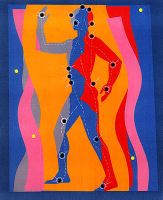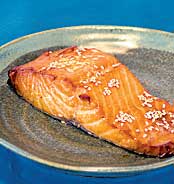 Researchers from Vanderbilt School of Medicine Nashville, Tennessee and the Shanghai Center for Disease Prevention and Control in the People’s Republic of China report a weak association. Continue reading Does drinking green tea reduce breast cancer risk?
Researchers from Vanderbilt School of Medicine Nashville, Tennessee and the Shanghai Center for Disease Prevention and Control in the People’s Republic of China report a weak association. Continue reading Does drinking green tea reduce breast cancer risk?
Monthly Archives: January 2009
Lose weight, gain control over incontinence
 Obesity correlates with urinary incontinence. Might weight loss be an effective treatment?
Obesity correlates with urinary incontinence. Might weight loss be an effective treatment?
Researchers from across the US decided to find out. Continue reading Lose weight, gain control over incontinence
CAMophobia at Medscape
 Â Here’s the link to a brief review written by Dr. Jonathan Silver from New York University School of Medicine.
 Here’s the link to a brief review written by Dr. Jonathan Silver from New York University School of Medicine.
You need read no further than the first paragraph to see the bias. Continue reading CAMophobia at Medscape
More tainted weight loss products
 Here’s an updated list of 69 contaminated products identified by the FDA.
Here’s an updated list of 69 contaminated products identified by the FDA.
What’s a consumer to think? Continue reading More tainted weight loss products
Soy effects on bone mineral density
![]() Supplementation is unlikely to have significant favorable [effect] on bone mineral density (BMD), according to this review by researchers at Sun Yat-sen University in Guangzhou, China.
Supplementation is unlikely to have significant favorable [effect] on bone mineral density (BMD), according to this review by researchers at Sun Yat-sen University in Guangzhou, China.
Is this the final word? Continue reading Soy effects on bone mineral density
ConsumerLab tests Coenzyme Q10
 Just 1 of 39 coenzyme Q10 (CoQ10) (ubiquinol) supplements tested contained levels lower than listed on the label.
Just 1 of 39 coenzyme Q10 (CoQ10) (ubiquinol) supplements tested contained levels lower than listed on the label.
But large variations in dose and forms may confuse consumers, according to ConsumerLab in their latest report. Continue reading ConsumerLab tests Coenzyme Q10
The STEP report on saw palmetto safety
 STEP stands for “Saw palmetto for Treatment of Enlarged Prostates.†Continue reading The STEP report on saw palmetto safety
STEP stands for “Saw palmetto for Treatment of Enlarged Prostates.†Continue reading The STEP report on saw palmetto safety
Treating tension-type headache with acupuncture
 It could be a valuable non-pharmacological tool in patients with frequent episodic or chronic tension-type headaches, according to this Cochrane review. Continue reading Treating tension-type headache with acupuncture
It could be a valuable non-pharmacological tool in patients with frequent episodic or chronic tension-type headaches, according to this Cochrane review. Continue reading Treating tension-type headache with acupuncture
Acupuncture to prevent migraine
 New data since the last review lead the authors of this Cochrane review to conclude, “Acupuncture should be considered a treatment option.” Continue reading Acupuncture to prevent migraine
New data since the last review lead the authors of this Cochrane review to conclude, “Acupuncture should be considered a treatment option.” Continue reading Acupuncture to prevent migraine
Omega-3 not effective for Crohn’s disease, again
 Â That’s the conclusion from this Cochrane review. Continue reading Omega-3 not effective for Crohn’s disease, again
 That’s the conclusion from this Cochrane review. Continue reading Omega-3 not effective for Crohn’s disease, again
Food allergy and intolerance week
It started January 19th, but it’s never too late to join in.
Here are several summaries posted over the past 2 years related to food preferences and the risk of allergy in infants. Continue reading Food allergy and intolerance week
Background on vitamin B-2
 Riboflavin (vitamin B-2) was originally recognized as a growth factor in 1879 and named vitamin B-2 according to the British nomenclature system.
Riboflavin (vitamin B-2) was originally recognized as a growth factor in 1879 and named vitamin B-2 according to the British nomenclature system.
Here’s what we know today. Continue reading Background on vitamin B-2
An innovative way to get elderly people to exercise
 Exercise, or simply expending energy through an activity that is a regular part of a person’s lifestyle may provide survival advantages, according to National Institute on Aging. The challenge is that about 75% of Americans over the age of 75 years live sedentary lives.
Exercise, or simply expending energy through an activity that is a regular part of a person’s lifestyle may provide survival advantages, according to National Institute on Aging. The challenge is that about 75% of Americans over the age of 75 years live sedentary lives.
Here’s an innovative way to meet that challenge.
Continue reading An innovative way to get elderly people to exercise
Does vitamin D reduce the risk of diabetes in infants?
 Vitamin D treatment during infancy might protect from the development of type 1 diabetes, according to this review of the medical literature by researchers from the Central Manchester and Manchester Children’s University Hospitals in the UK. Continue reading Does vitamin D reduce the risk of diabetes in infants?
Vitamin D treatment during infancy might protect from the development of type 1 diabetes, according to this review of the medical literature by researchers from the Central Manchester and Manchester Children’s University Hospitals in the UK. Continue reading Does vitamin D reduce the risk of diabetes in infants?
Apitherapy: Experience of German Beekeepers
 Â Apitherapy is the use of bee products such as honey to prevent or treat illness and promote healing.
 Apitherapy is the use of bee products such as honey to prevent or treat illness and promote healing.
Researchers at Justus-Liebig-University in Giessen, Germany conducted a survey of beekeepers. Continue reading Apitherapy: Experience of German Beekeepers
Omega-3 and the nephrotic syndrome
 Nephrotic-range proteinuria is defined as urinating more than 3.5 grams of protein per day. That’s 25 times the normal amount, and is the primary indicator of the nephrotic syndrome — a group of diseases that damage the kidneys’ filtering system.
Nephrotic-range proteinuria is defined as urinating more than 3.5 grams of protein per day. That’s 25 times the normal amount, and is the primary indicator of the nephrotic syndrome — a group of diseases that damage the kidneys’ filtering system.
Researchers at the Glasgow Royal Infirmary in the United Kingdom looked at the effect of omega-3 fatty acids. Continue reading Omega-3 and the nephrotic syndrome
Are the benefits of eating fatty fish due to selenium?
 Â Researchers at Hopital La Colombiere in Montpellier, France tell us, “The observed health benefits of fish consumption in the elderly could be related not only to the increase in omega-3 fatty acid intake but also to other nutrients such as selenium.” Continue reading Are the benefits of eating fatty fish due to selenium?
 Researchers at Hopital La Colombiere in Montpellier, France tell us, “The observed health benefits of fish consumption in the elderly could be related not only to the increase in omega-3 fatty acid intake but also to other nutrients such as selenium.” Continue reading Are the benefits of eating fatty fish due to selenium?
Prevalence of vitamin B-12 deficiency
 Â Since fortification of flour with folic acid started 10 years ago in the US, efforts have been taken to fortifying flour with vitamin B-12.
 Since fortification of flour with folic acid started 10 years ago in the US, efforts have been taken to fortifying flour with vitamin B-12.
So, how prevalent is B-12 deficiency? Continue reading Prevalence of vitamin B-12 deficiency
How many patients for an acupuncture study?
 Â It’s an important issue when planning clinical studies of CAM.
 It’s an important issue when planning clinical studies of CAM.
Researchers from the David Geffen School of Medicine at the University of California, Los Angeles address this issue for a study of acupuncture in the relief of post-chemotherapy fatigue in breast cancer patients. Continue reading How many patients for an acupuncture study?
Farm animals help treat mental disorders
 Researchers from the Norwegian University tell us, “The benefits of animal-assisted therapy (AAT) for humans with mental disorders have been well-documented using cats and dogs.”
Researchers from the Norwegian University tell us, “The benefits of animal-assisted therapy (AAT) for humans with mental disorders have been well-documented using cats and dogs.”
But what about farm animals? Continue reading Farm animals help treat mental disorders